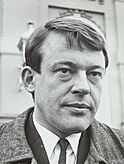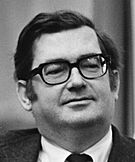Democrats 66 facts for kids
Democrats 66 (Dutch: Democraten 66), often called D66, is a political party in the Netherlands. It believes in ideas like social liberalism and progressivism. This means they support individual freedoms, social justice, and making society better. The party is usually seen as being in the centre or slightly to the centre-left of the political world.
The party's name comes from the year it was started, 1966. At first, D66 wanted to make the Dutch political system more democratic. Over time, their ideas grew to include a wider range of social liberal goals. In their first election in 1967, they won 7 out of 150 seats. This was a big achievement for a new party. D66 has been part of the government several times, including from 1973 to 1977 and 2017 to 2024. As of October 2025, D66 has nine seats in the House of Representatives. They also hold five seats in the Senate and three seats in the European Parliament.
Many people who vote for D66 have a university degree. Their supporters often live in bigger cities and wealthier areas. The party also provides many mayors, who are chosen, not elected, in the Netherlands.
Currently, Rob Jetten leads the party. He became the party leader on August 12, 2023. Other important leaders include Paul van Meenen in the Senate and Gerben-Jan Gerbrandy in the European Parliament.
Contents
A Look at D66's Journey: History of the Party
How D66 Started (1966–1986)
Democrats 66 began on October 14, 1966. It was founded by a group of 44 people. Many of them had been part of other political parties before. The main founders were Hans van Mierlo, a journalist, and Hans Gruijters, a local politician. Van Mierlo became the party's first political leader.
The party wanted to change the Dutch political system. They felt that old ways of thinking were holding things back. D66 wanted more modern and scientific ways of making decisions.
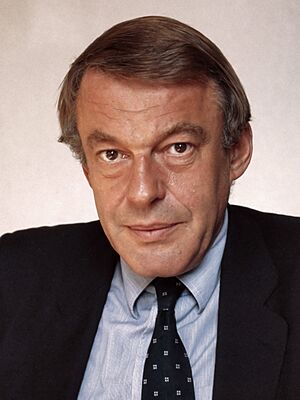
In the 1967 election, D66 won seven seats in the House of Representatives. This was a big success for a new party. In 1971, they won even more seats. They then worked with the Labour Party and the Political Party of Radicals to form a "shadow cabinet." This is a group of opposition politicians who would form the government if their party won.
In the 1972 election, D66 joined an alliance called the "Progressive Agreement." Even though D66 lost some seats, the alliance became a strong force. They formed a government with other parties, led by Joop den Uyl. Hans Gruijters became a minister. After this, Hans van Mierlo stepped down as leader. Jan Terlouw took his place.
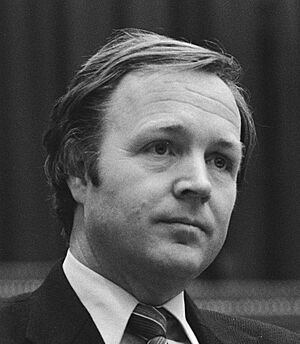
Between 1972 and 1974, D66 faced challenges. They lost many members and did not do well in local elections. Some members even suggested closing down the party. But Jan Terlouw worked hard to make the party strong again. He focused on new topics like the environment and public education. This helped the party grow its membership. In the 1977 election, D66 gained two more seats.
In the 1981 election, D66 won 17 seats. They joined a government with the Labour Party and the Christian Democratic Appeal (CDA). Jan Terlouw became the Minister of Economic Affairs. However, this government did not last long due to disagreements. In the next election in 1982, D66 lost many seats. Terlouw then left politics, and Maarten Engwirda became the new leader. The party then spent time in opposition.
Working in Government and Later Changes (1986–Present)
In 1986, Hans van Mierlo returned to lead D66. He wanted to bring different political groups together to form a government. In the 1994 election, D66 doubled its seats to 24. This allowed them to form a special government called the "purple government." This government included both the social democratic Labour Party and the conservative liberal VVD. Van Mierlo became the Minister of Foreign Affairs.
This "purple government" introduced many modern laws. These included laws that supported same-sex marriage and other personal freedoms. The government's economic policies were also seen as very successful.
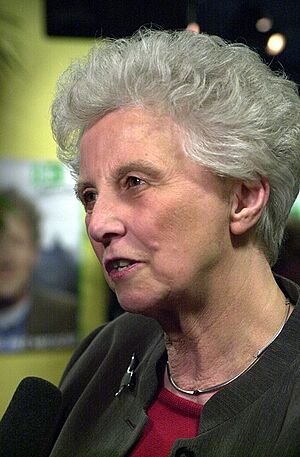
Before the 1998 election, Van Mierlo stepped down. Els Borst, the Minister of Health, became the new top candidate. D66 lost some seats, but the "purple government" continued. Borst became Deputy Prime Minister. Later, a disagreement over a law about referendums caused D66 to leave the government for a short time. They returned after getting promises for new laws, including directly elected mayors.
In the 2002 election, D66 lost more seats. They were left with only seven. After another election in 2003, D66 joined a new government with the CDA and VVD. This government focused on reforms. D66 supported these changes in exchange for more investment in education and the environment. Alexander Pechtold became a minister during this time.
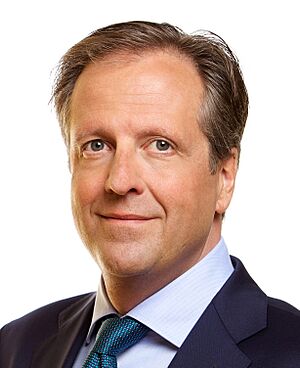
In 2006, a disagreement within the government led to D66 ministers leaving their positions. This caused the government to fall. Later that year, Alexander Pechtold was chosen as the new party leader. Under his leadership, D66 became known for standing up against certain other political parties.
D66 started to do better in elections. In the 2009 European Parliament election, they won more seats. In the 2010 and 2012 general elections, they also gained more seats. The party's membership grew significantly during this time.
In the 2017 election, D66 won 19 seats. They joined a new government with the VVD, CDA, and Christian Union. Kajsa Ollongren became the second Deputy Prime Minister.
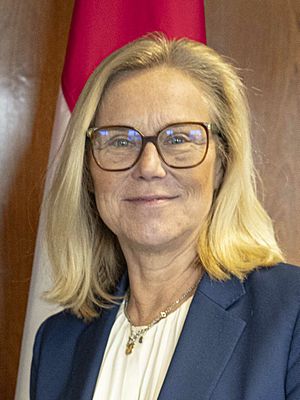
In 2018, Alexander Pechtold retired from politics. Rob Jetten became the parliamentary leader. In 2020, Sigrid Kaag was elected the new party leader. In the 2021 election, D66 won 24 seats, becoming the second-largest party. On August 12, 2023, Rob Jetten became the leader of the party. In the 2023 Dutch general election, D66 saw a decrease in seats, going from 24 to 9.
What D66 Believes In: Ideology
The ideas of D66 are often discussed within the party. There are two main ways of thinking: radical democrats and progressive liberals. These two groups work together, as both believe in helping individuals achieve their full potential.
Different Ways of Thinking in D66
Radical Democrats
When D66 first started, they strongly believed in making Dutch society and its political system more democratic. They wanted to change how elections worked to make them fairer. This group also believed in a practical, problem-solving approach to politics, rather than sticking to old rules. Hans van Mierlo, one of the founders, was a key supporter of these ideas.
Progressive Liberals
Over time, D66 also developed a strong progressive liberal side. Under Jan Terlouw's leadership, the party started focusing on new topics. These included protecting the environment, improving public education, and encouraging innovation. This part of the party believes in modern ideas and social progress.
Key Ideas of D66
Here are some of the main things D66 believes in:
- D66 supports a mixed economy. This means they believe in a balance between free markets and government help. They also want to make it easier for people to change jobs and reduce taxes for everyday families.
- They want to spend more government money on education and innovation. This includes better pay for teachers. D66 also wants to give schools more freedom in how they operate.
- The environment is very important to D66. They support ideas like a carbon price to help fight global warming. They also want more investment in sustainable energy.
- D66 is a culturally liberal party. This means they support equal rights and personal freedoms for everyone. For example, they supported laws for same-sex marriage.
- D66 wants to improve how democracy works. They support ideas like binding referendums, which allow citizens to vote directly on laws. They also want people to directly elect their prime ministers and mayors.
Who Votes for D66: Electorate
Many people who vote for Democrats 66 have a good education. A lot of their supporters are also civil servants. D66 is especially popular in the Randstad conurbation, which is a busy area in the Netherlands. They also get many votes in and around university towns. In the 2014 local elections, D66 became the biggest party in many large cities. These included Amsterdam, The Hague, Utrecht, and Groningen.
How D66 Has Done in Elections: Election Results
House of Representatives
| Election | Lead candidate | List | Votes | % | Seats | +/– | Government |
|---|---|---|---|---|---|---|---|
| 1967 | Hans van Mierlo | List | 307,810 | 4.4 |
|
New | Opposition |
| 1971 | List | 427,720 | 6.7 |
|
Opposition | ||
| 1972 | List | 307,048 | 4.1 |
|
Coalition | ||
| 1977 | Jan Terlouw | List | 452,423 | 5.4 |
|
Opposition | |
| 1981 | List | 961,121 | 11.0 |
|
Coalition | ||
| 1982 | List | 351,278 | 4.3 |
|
Opposition | ||
| 1986 | Hans van Mierlo | List | 562,466 | 6.1 |
|
Opposition | |
| 1989 | List | 701,934 | 7.9 |
|
Opposition | ||
| 1994 | List | 1,391,202 | 15.5 |
|
Coalition | ||
| 1998 | Els Borst | List | 773,497 | 9.0 |
|
Coalition | |
| 2002 | Thom de Graaf | List | 484,317 | 5.1 |
|
Opposition | |
| 2003 | List | 393,333 | 4.0 |
|
Coalition | ||
| 2006 | Alexander Pechtold | List | 193,232 | 2.0 |
|
Opposition | |
| 2010 | List | 654,167 | 6.9 |
|
Opposition | ||
| 2012 | List | 757,091 | 8.0 |
|
Opposition | ||
| 2017 | List | 1,285,819 | 12.2 |
|
Coalition | ||
| 2021 | Sigrid Kaag | List | 1,565,861 | 15.0 |
|
Coalition | |
| 2023 | Rob Jetten | List | 656,292 | 6.3 |
|
Opposition | |
| 2025 | List |
Senate
| Election | Lead candidate | List | Votes | % | Seats | +/– |
|---|---|---|---|---|---|---|
| 1971 |
|
New | ||||
| 1974 |
|
|||||
| 1977 |
|
|||||
| 1980 | Jan Glastra van Loon |
|
||||
| 1981 |
|
|||||
| 1983 |
|
|||||
| 1986 | Jan Vis |
|
||||
| 1987 |
|
|||||
| 1991 |
|
|||||
| 1995 | Eddy Schuyer | List |
|
|||
| 1999 | List | 8,542 | 5.4 |
|
||
| 2003 | List | 7,087 | 4.4 |
|
||
| 2007 | Gerard Schouw | List | 3,270 | 2.0 |
|
|
| 2011 | Roger van Boxtel | List | 12,651 | 7.6 |
|
|
| 2015 | Thom de Graaf | List | 21,997 | 13.0 |
|
|
| 2019 | Annelien Bredenoord | List | 15,154 | 8.8 |
|
|
| 2023 | Paul van Meenen | List | 11,144 | 6.2 |
|
European Parliament
| Election | Lead candidate | List | Votes | % | Seats | +/– | EP Group |
|---|---|---|---|---|---|---|---|
| 1979 | Aar de Goede | List | 511,967 | 9.03 |
|
New | NI |
| 1984 | Doeke Eisma | List | 120,826 | 2.28 |
|
– | |
| 1989 | Jan-Willem Bertens | List | 311,990 | 5.95 |
|
LDR | |
| 1994 | List | 481,826 | 11.66 |
|
ELDR | ||
| 1999 | Lousewies van der Laan | List | 205,623 | 5.80 |
|
||
| 2004 | Sophie in 't Veld | List | 202,502 | 4.25 |
|
ALDE | |
| 2009 | List | 515,422 | 11.32 |
|
|||
|
|
|||||||
| 2014 | List | 735,825 | 15.48 |
|
|||
| 2019 | List | 389,692 | 7.09 |
|
RE | ||
|
|
|||||||
| 2024 | Gerben-Jan Gerbrandy | List | 523,650 | 8.40 |
|
How D66 is Organized: Structure and Leadership
Name and Logo
When the party started, it was called Democrats '66 (Dutch: Democraten '66). The name showed their goal of making things more democratic. The '66 referred to the year it was founded, making it sound modern. In 1981, they dropped the apostrophe. The name D66 had become well-known, but the year no longer felt as new.
How the Party Works
The most important meeting for D66 is the General Assembly. All members can attend this meeting. They choose the party's board and make final decisions about the party's plans. Members also directly choose who will represent them in the Senate, House of Representatives, and European Parliament. D66 has many local groups, called branches, across the Netherlands.
Party Leaders
Chairpersons
|
|
Parliamentary Leaders
|
|
Groups D66 Works With
The youth wing of D66 is called the Young Democrats (Dutch: Jonge Democraten). Many important D66 members started in this group. The Young Democrats are part of larger European and international youth organizations.
D66 also helped create the Netherlands Institute for Multiparty Democracy. This group helps support democracy in other countries. The Hans van Mierlo Foundation is the party's special research center. It helps develop new ideas and policies.
International Connections
D66 is part of international groups like the Liberal International. They are also a member of the Alliance of Liberals and Democrats for Europe (ALDE). These connections help D66 work with similar parties around the world.
D66 in the European Parliament
The D66 representatives in the European Parliament are part of the Renew Europe group. Before 1979, D66 members in the European Parliament were part of the Socialist Group. Since 1989, they have been part of liberal groups like ALDE.
The current D66 members in the European Parliament, after the 2024 election, are:
- Gerben-Jan Gerbrandy, who leads the group
- Raquel Garcia Hermida-van der Walle
- Brigitte van den Berg
D66 in the Committee of the Regions
D66 also has members in the European Committee of the Regions. This committee helps local and regional governments have a say in European laws. D66 members are part of the Renew Europe CoR group.
Water Boards
D66 does not run its own candidates for water board elections. Instead, they suggest their voters support Water Natuurlijk. This is a separate, environmentally focused party that deals only with water management.
See also
 In Spanish: Demócratas 66 para niños
In Spanish: Demócratas 66 para niños
- Liberal democracy
- Liberalism in the Netherlands
- Water Natuurlijk
 | Percy Lavon Julian |
 | Katherine Johnson |
 | George Washington Carver |
 | Annie Easley |


